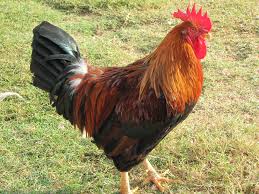cock
英 [kɒk]
美 [kɑːk]
- n. 公鸡;龙头;雄鸟;头目
- vt. 使竖起;使耸立;使朝上
- vi. 翘起;竖起;大摇大摆
- n. (Cock)人名;(英、西、瑞典)科克
使用频率:

记忆方法
西方人觉得水龙头长得像头顶鸡冠的鸡头,所以 cock 既表公鸡又表龙头。
中文词源
cock 公鸡
来自PIE*keuk, 鸡叫声,词源同chicken.
英语词源
- cock
-
cock: [OE] The word cock is probably ultimately of onomatopoeic origin, imitative of the male fowl’s call (like the lengthier English cock-adoodle- doo [16], French coquerico, and German kikeriki). Beyond that it is difficult to go with any certainty; it reflects similar words in other languages, such as medieval Latin coccus and Old Norse kokkr, but which if any the English word was borrowed from is not clear.
It has been suggested that it goes back to a Germanic base *kuk-, of which a variant was the source of chicken, but typical Old English spellings, such as kok and kokke, suggest that it may have been a foreign borrowing rather than a native Germanic word – perhaps pointing to Germanic coccus. The origin of the interconnected set of senses ‘spout, tap’, ‘hammer of a firearm’, and ‘penis’ is not known; it is possible that it represents an entirely different word, but the fact that German hahn ‘hen’ has the same meanings suggests otherwise.
Of derived words, cocker [19], as in ‘cocker spaniel’, comes from cocking, the sport of shooting woodcock, and cocky [18] is probably based on the notion of the cock as a spirited or swaggering bird, lording it over his hens (there may well be some connection with cock ‘penis’, too, for there is an isolated record of cocky meaning ‘lecherous’ in the 16th century). Cockerel [15] was originally a diminutive form.
=> chicken, cocky - cock (n.1)
- "male chicken," Old English cocc "male bird," Old French coc (12c., Modern French coq), Old Norse kokkr, all of echoic origin. Old English cocc was a nickname for "one who strutted like a cock," thus a common term in the Middle Ages for a pert boy, used of scullions, apprentices, servants, etc.
A common personal name till c. 1500, it was affixed to Christian names as a pet diminutive, as in Wilcox, Hitchcock, etc. Slang sense of "penis" is attested since 1610s (but compare pillicock "penis," from c. 1300); cock-teaser is from 1891. A cocker spaniel (1823) was trained to start woodcocks. Cock-and-bull is first recorded 1620s, perhaps an allusion to Aesop's fables, with their incredible talking animals, or to a particular story, now forgotten. French has parallel expression coq-à-l'âne. - cock (n.2)
- in various mechanical senses, such as cock of a faucet (early 15c.) is of uncertain connection with cock (n.1), but German has hahn "cock" in many of the same senses. The cock of an old matchlock firearm is 1560s, hence half-cocked (for which see half).
- cock (v.)
- mid-12c., cocken, "to fight;" 1570s, "to swagger;" seeming contradictory modern senses of "to stand up" (as in cock one's ear), c. 1600, and "to bend" (1898) are from the two cock nouns. The first is probably in reference to the posture of the bird's head or tail, the second to the firearm position. To cock ones hat carries the notion of "defiant boastfulness."
权威例句
- 1. His hands were too weak to cock his revolver.
- 他的手没劲儿,扳不动左轮手枪的扳机。
- 2. He was in danger of making a real cock-up of this.
- 他很有可能会把这事弄得一团糟。
- 3. This was just an administrative cock-up.
- 这纯粹是管理上的混乱。
- 4. The cock's breast is tinged with chestnut.
- 这只公鸡胸部羽毛呈浅栗色,带有白色细条纹。
- 5. There's been a bit of a cock-up over the travel arrangements.
- 旅行安排出了点儿岔子。